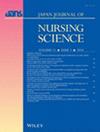The transition process of perceptions of hygiene care practices among nurses in acute-care wards: A grounded theory study
Abstract
Aim
To explore how perceptions of hygiene care practices among nurses in acute-care wards change over their clinical experience.
Methods
Based on symbolic interactionism, we employed a grounded theory methodology to explore interrelationships of meaning arising from actors' perceptions and interactions. Thirty-three nurses working in acute-care wards for >3 years were selected by purposive snowball and theoretical sampling; semi-structured individual interviews were conducted from October 2023 to February 2024. Data were analyzed for 32 participants who provided consent.
Results
The core category was “adjusting care channels”; seven other categories also emerged. Care channels refer to options for hygiene care practices. When nurses are first assigned to a ward, they regard hygiene care as the “bare task under organization rules.” However, through repeated processes of “emerging caring with patient resonance” and “internalizing the meaning of care,” they can “form care channels.” Subsequently, nurses become practitioners who can transform practices of hygiene care into “care to be restricted” or “wealth of ‘life behind the curtain’” by “adjusting care channels” according to the patient and ward organization situation. In contrast, if nurses fail to internalize the meaning of care, they end up performing “pro forma activities.”
Conclusions
Our findings highlight the importance of nurses to improve their ability to “adjust care channels,” which would allow them to provide hygiene care in a manner appropriate to the patient and organizational context. These results contribute to the development of educational strategies that foster nurses' values of hygiene care and support strategies by nursing managers.

 求助内容:
求助内容: 应助结果提醒方式:
应助结果提醒方式:


